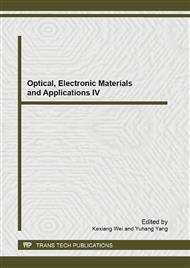p.389
p.393
p.397
p.402
p.406
p.410
p.415
p.420
p.424
Numerical Control System Based on Permanent Magnet Linear Synchronous Motor
Abstract:
Linear servo system is an important part of numerical control machine tool, and its performance and quality will directly decide and affect the rapidity, stability and accuracy of numerical control device. The servo system made up of linear motor can realize zero transmission between motor and worktable with various advantages as fast response, high efficiency and position tracking precision. In this paper, the permanent magnet linear synchronous motor is used as actuator, and according to the idea of space vector decoupling control, the linear servo control structure is established based on position proportion adjustment and speed IP adjustment. On such backgrounds, the paper studies the iterative learning control method so as to realize the perfect position tracking ability and robust performance of the system. Chinese Library Classification: TG659
Info:
Periodical:
Pages:
406-409
DOI:
Citation:
Online since:
July 2013
Authors:
Price:
Сopyright:
© 2013 Trans Tech Publications Ltd. All Rights Reserved
Share:
Citation:


